Nemtsov murder: Family of two suspects fights charges
- Published
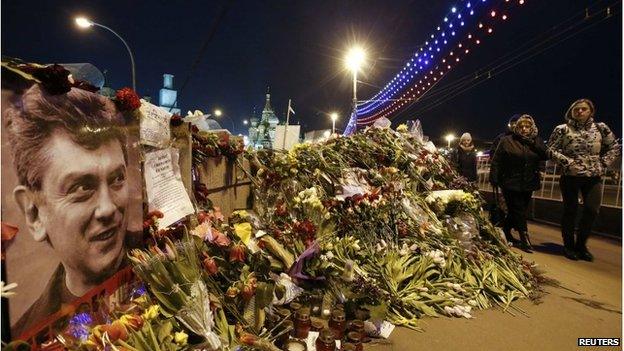
The motive for Boris Nemtsov's murder, in sight of the Kremlin walls, remains unclear
The Gubashev family is now at the heart of Russia's biggest murder enquiry.
At their home deep in the North Caucasus, the children play in the corridor but the adults' faces are drawn and anxious.
A week ago, Anzor and Shagid Gubashev were arrested and accused of involvement in the 27 February murder of opposition politician Boris Nemtsov, metres from the Kremlin.
They are now in custody in Moscow.
'Kind and respectful'
"I am sure they're not guilty. How can they be, if they wouldn't hurt a fly?" their mother Zulai asks. "If I thought they were the killers I'd say, 'Do what you want with them'. But they couldn't do something like this," she says, between sobs.
The women of the family describe Anzor, 33, and Shagid, 32, as kind and respectful.
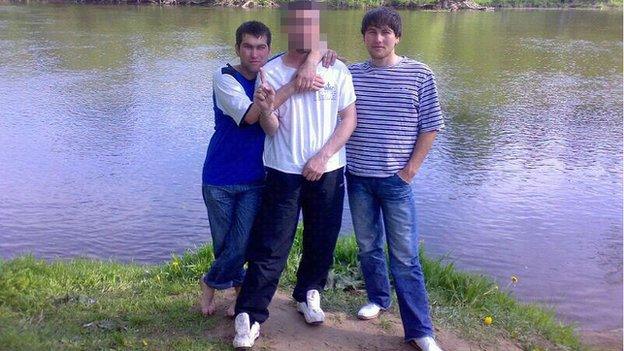
Ethnic Chechens Anzor and Shagid Gubashev, here with a relative (C), moved to Moscow for work 10 years ago
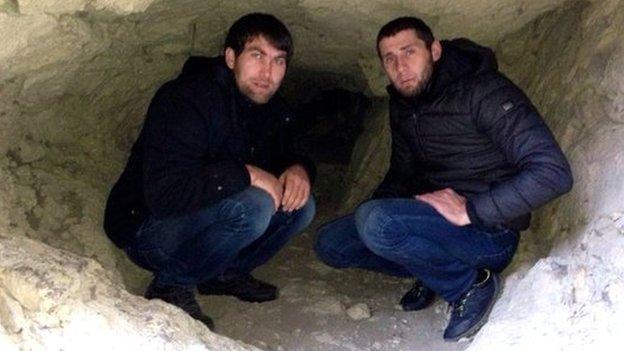
Anzor Gubashev, left, with his cousin Zaur Dadayev, a former Interior Ministry deputy commander in Chechnya
Ethnic Chechens, they grew up in the neighbouring republic of Ingushetia but both left for Moscow a decade ago to find work.
After military service, Anzor picked up odd jobs, most recently as a shop security guard, Zulai says. Shagid had regular work driving a lorry.
Recent family snapshots, not shared before now, show the brothers relaxing with relatives and Shagid posing on a winter break in Egypt.
There is also a picture with their cousin Zaur Dadayev, former deputy commander of a battalion of Interior Ministry troops in Chechnya.
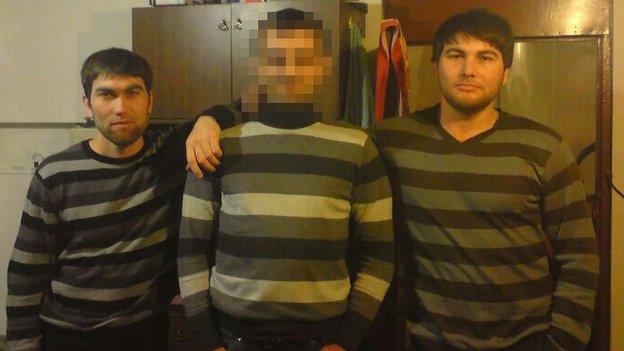
The Gubashev brothers, again with a relative (C), were brought up in the village of Vosnesenskoye
He and Anzor Gubashev have been formally charged with "organising and carrying out" the murder of Boris Nemtsov.
Shagid Gubashev is still being held as a suspect, with two other men.
No supporting evidence has yet been made public.
Boris Nemtsov was one of President Putin's sharpest critics - on everything from corruption to the war in Ukraine. His friends fear that is why he was targeted. Others have speculated that the shooting is part of a power struggle inside the Kremlin.
Vladimir Putin has called the killing on his doorstep "shameful" and ordered it solved.
'Not the type'
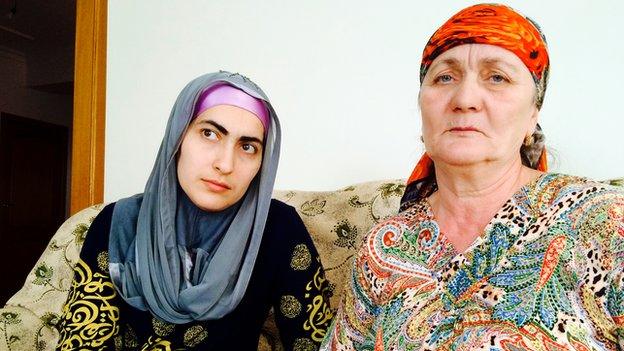
The suspects' mother Zulai (R) and their aunt describe the brothers as kind and respectful
Back in Ingushetia, Zulai remembers seeing the news of Boris Nemtsov's death on television. She felt "sad, as a human being" that he had been shot but insists that her own family is far removed from Moscow politics.
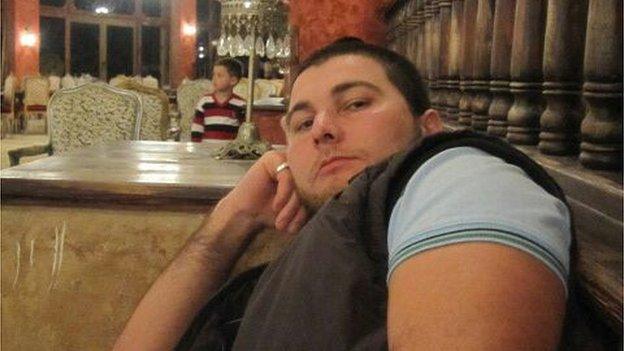
Shagid Gubashev posing on a winter break in Egypt
The Gubashev brothers were brought up in the village of Vosnesenskoye - as were Zaur Dadayev and at least one other suspect - though the family has since been resettled in the next town after a landslide.
But the small mosque still functions on the hill at the village entrance, and after Friday prayers men discuss the arrests.
Many went to school with at least one of the suspects.
"They're not the kind of lads to get involved in something like this," one of Anzor Gubashev's former classmates tells me.
"Perhaps they were used; asked to follow someone, or deliver something for money and didn't know what they were mixed up in," he wonders.
The men reject an early investigation theory that Boris Nemtsov's killers were driven by anger at cartoons of the prophet Mohammed published by the French magazine Charlie Hebdo.
The liberal politician, that theory went, was targeted for supporting the caricaturists.
But the village imam did not know the suspects and residents say the Charlie Hebdo cartoons were not a big talking point there.
'Marks on toes'
The Gubashev brothers were arrested the week before and had been driving into Vosnesenskoye in Shagid's black BMW.
"They had one of them on the floor in handcuffs and they were sitting on top of the other one searching him," a witness told the BBC.
Both brothers had bags pulled over their heads.
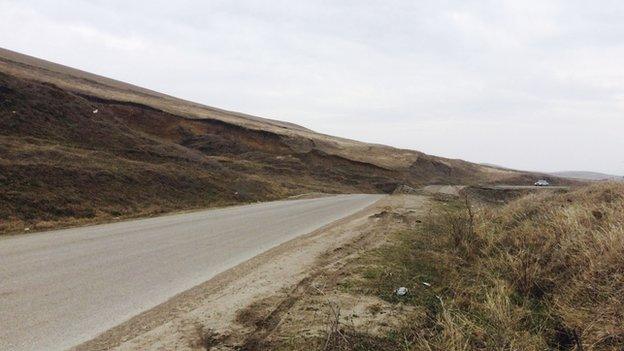
The brothers had been driving into Vosnesenskoye in Shagid's black BMW when they were arrested
The officers were using unmarked cars, suggesting they were from Russia's FSB security service, and removed the licence plates from Shagid's car before whisking the pair away.
The next their family saw of them was on television, being bundled into court in Moscow by heavily armed, masked security forces.
At the hearing the judge said that Zaur Dadayev had confessed to his involvement.
He has since claimed the admission was obtained through torture.
"They told him no-one knows where you are, so confess," reports Andrei Babushkin, a prison monitor who visited all three cousins behind bars.
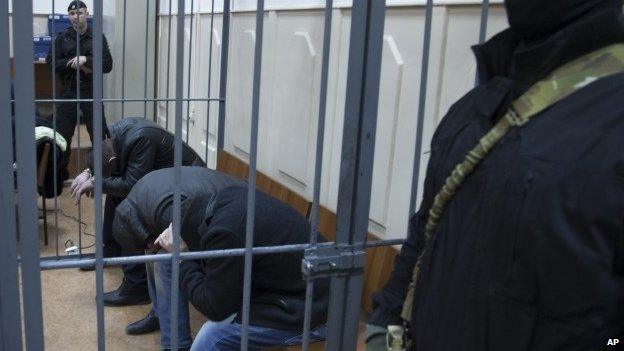
Shagid Gubashev, centre, sits in a court room in Moscow on 8 March
Zaur Dadayev says that he was beaten in Ingushetia, where he was held before being moved to Moscow.
"I saw marks on his toes characteristic of burns from bare cables. It would need to be confirmed by a specialist, but they definitely looked like the marks from electric shock," says Mr Babushkin.
The Gubashev brothers were detained after this alleged abuse and confession.
But their sister, Rumisa, argues that their actions point to their innocence: They had come looking for their cousin after his arrest.
"I'm not educated, and even I would have hidden if I was guilty," she says. "So why wouldn't they?"
Investigators have still not released any CCTV images from the crime scene nor revealed how they are tying the five suspects to the killing.
The only link the Gubashevs can see for now is that the men left Moscow immediately after the murder.
They fear the brothers could be pawns in a much bigger, political game.
So while their father tries to get access to see them in Moscow, the women wait and worry back in the Caucasus.
Zulai always dreamed of her sons getting married and giving her grandchildren. Now she fears they will not be visiting for a long time.